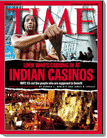 By Rob Schmidt
By Rob SchmidtJanuary 29, 2003
 By Rob Schmidt
By Rob Schmidt
January 29, 2003
PECHANGA INDIAN RESERVATION — Last week's Western Indian Gaming Conference was the first major opportunity for Natives to address Time's hatchet job on Indian casinos, and they took advantage of it. Their reactions ranged from "yellow journalism" to "lies and trash."
Jacob Coin, executive director of CNIGA, devoted his thoughts at the opening session to Time's report. Will it influence the legislative agenda for Indians? he asked. His answer was an unfortunate yes.
Time's premise was that Indian gaming is untaxed, unregulated, and unfair competition, said Coin—all of which is untrue. The National Gambling Impact Study Commission heard from more than 100 tribal witnesses at seven field hearings. Its conclusion, according to Coin: "Indian gaming is every bit as well regulated as state gaming."
"I don't think Time magazine should be allowed to set public policy," he continued. "You can't judge Indian gaming based on snapshots" that don't tell the whole story. Tribes are trying to be responsive to their members and to the surrounding communities. "All we're asking for is a balanced debate."
"You Tell Them They're Wrong"
Then Ernest Stevens Jr., chairman of NIGA, stepped to the plate.
"Indians are doing more than their fair share of keeping the economy rolling," he pronounced. Gaming is providing jobs, health care, and education to tribal members while benefiting their neighbors as well. "We're not going to let them [Time] talk about Indian country they way they did."
Stevens derided Time's notion that Indians are coming out of the woodwork to get rich. "If someone says ‘They want to be Indians to start casinos,' you tell them they're wrong."
He admitted Time scored a few points but denounced the report as a whole. "We think we're the best in the industry, but we're not perfect. Ninety percent of what they said were lies and trash. Just because they take the 10% that we're already working on, should we stand up and say ‘good article'? No."

Stevens offered a historical perspective for Time's benefit. "Nobody needs to tell us about sharing resources. We've been doing it since the beginning of time." Invoking memories of Jamestown, the Pilgrims, and Lewis and Clark, he noted that "immigration to our country wouldn't have happened if we hadn't shared."
(Or as comedian Charlie Hill put it, the colonists were "lost in the woods" until the Indians helped them. "I've seen ‘The Blair Witch Project,'" said Hill. "I know how you are.")
Time's comments about Indians skirting environmental regulations were equally off-base, added Stevens. "We've been environmentalists since Day 1."
Wolf at the Door
John Harte, NIGA's legislative director and general counsel, gave the audience some idea of how Time's report could affect them. Rep. Frank Wolf (R-Va.), who has proposed to "study" Indian gaming even though it's been thoroughly studied before, distributed the articles to every member of Congress. Moreover, he mailed them to his 7.2 million constituents—at taxpayer expense.
The result? "Expect to see more attacks" on issues near and dear to Indians, said Harte.
For a compilation of the responses to Time's attack on Indian gaming, go to Responses to TIME's Attack on Indian Gaming.
Related links
TIME Wins First Annual Stereotype of the Year Award
The facts about Indian gaming
Rob's work for Pechanga.Net
|
. . . |

|
All material © copyright its original owners, except where noted.
Original text and pictures © copyright 2007 by Robert Schmidt.
Copyrighted material is posted under the Fair Use provision of the Copyright Act,
which allows copying for nonprofit educational uses including criticism and commentary.
Comments sent to the publisher become the property of Blue Corn Comics
and may be used in other postings without permission.